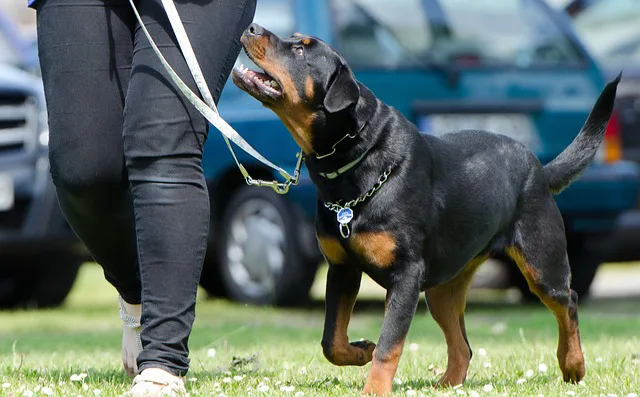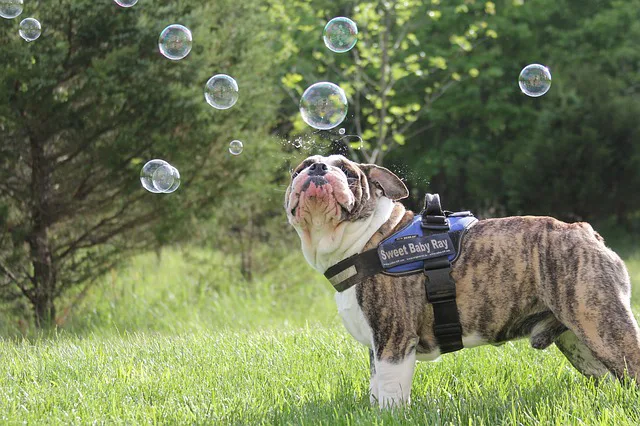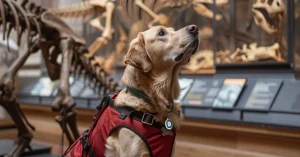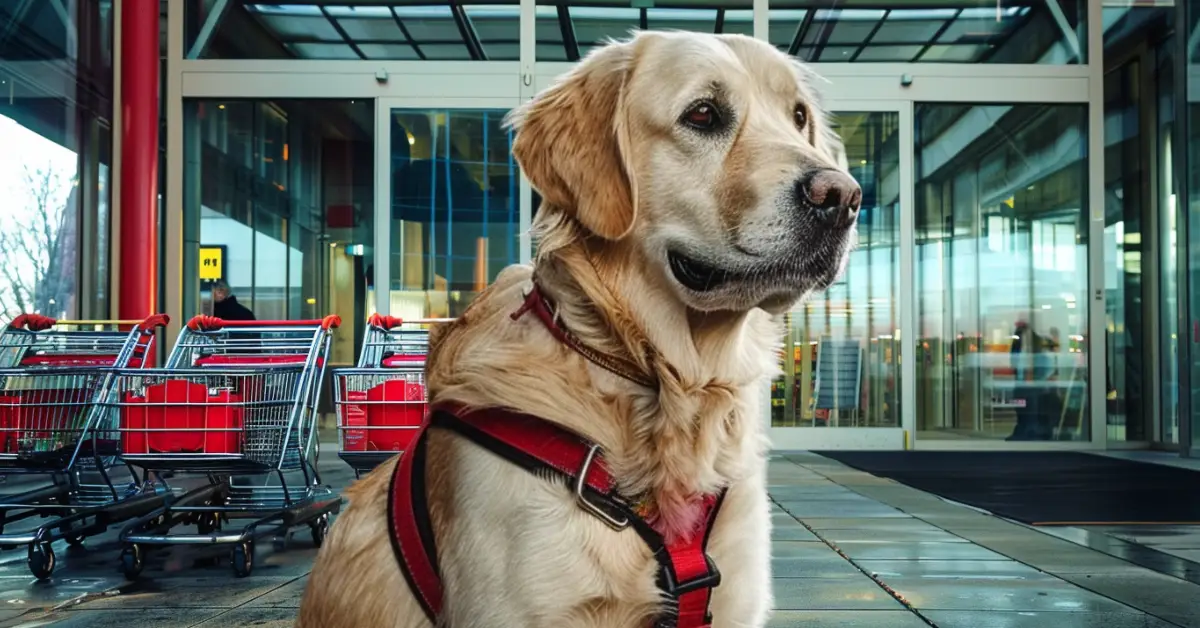How to Certify a Service Dog

If you want to be certified for a service dog, just follow these 5 steps:
- Identify whether you have an ADA-eligible disability (which can be physical or psychiatric).
- Get a health confirmation letter from your doctor or therapist. This step is optional, but a PSD letter can be helpful backup documentation.
- Train your dog to perform a task that helps with your condition.
- Make sure your dog is comfortable in public spaces; they should be able to pass a public access test.
- Certify your dog’s service dog status by getting a certificate stating you’ve met all service dog requirements — but remember, this step is not required.
You can’t qualify for a service dog just by getting a certification. Certifications are used by service dog owners for personal convenience, but they are not required under ADA rules. If someone refuses to let your service dog in because you don’t have a certificate, they are in the wrong. To verify a service dog, they can ask you just two questions: 1. Is the dog a service dog required for a disability? and 2. What work or task has the dog been trained to perform?
ADA Service Dog Certification Requirements
Here’s something that might surprise you: service dogs don’t need any official paperwork to do their important work! The ADA keeps things simple — no special licenses or registrations are required. This is what is stated on the official ADA website:
“Covered entities may not require documentation, such as proof that the animal has been certified, trained, or licensed as a service animal, as a condition for entry.”
What really matters is that your service dog is well-trained and can perform specific tasks to help with your disability. But here’s something to consider — while certification isn’t required, getting your service dog certified voluntarily can make life easier.
Think of it like having a VIP pass at a concert. Sure, you can still get in without it, but having one might make the whole experience smoother. With a certificate stating you’ve qualified as a service dog owner, you’ll sometimes face fewer questions when entering stores or restaurants, and some property managers might be more welcoming when you’re looking for housing. Just remember: whether you choose to get a certificate or not, the law is still on your side, and businesses must respect your right to have your service dog with you.
Service Dog Certifiers
In the U.S., there is no government certification program for service dogs. No organization or company has been sanctioned under ADA rules as an official service dog certifier.
Certification of a service dog is done voluntarily by service dog owners through private organizations like us here at Service Dog Certifications. You can get accessories like vests, tags, ID cards, and certificates from organizations like ours to make your life as a service dog handler in public areas easier.

How to Train a Certified Service Dog
If you want your dog to be a certified service dog, you do it through training the dog to help with your disability. A certificate can demonstrate that you completed the training, but you can’t just buy a certificate and call it a day. When training a dog to become a certified service animal, you have three main options: self-training, group classes, or individual training. Each method has its benefits and drawbacks, especially for service animals.
Self-Training
Self-training is the cheapest option and means teaching your service dog on your own. One benefit is that you and your dog can form a greater bond during the experience and also have the flexibility to train when the time suits you. Plus, you’ll gain skills to train your dog in new tasks as your needs change.
For example, if you train your dog to retrieve items, you’ll learn to break down complex tasks into smaller steps. This knowledge can help when you need to teach new services later, like opening doors or providing balance support.
Group Classes
Looking to save money on service dog training? Group classes offer an affordable sweet spot between expensive private lessons and budget-friendly self-training.
One of the biggest perks of group training is the real-world practice your dog gets. Your future service dog will learn to stay focused on you even when other dogs are nearby – a must-have skill for public access work. It can help your dog calmly ignore other animals at the grocery store or stay perfectly still under a restaurant table.
During these classes, you’ll work on essential service dog commands like “leave it,” “stay,” and “under” alongside other handlers. Plus, there’s a hidden benefit: you’ll connect with people who truly understand your journey. Many handlers find lasting friendships and valuable support networks through group classes.
But before you sign up, consider your schedule. Most group classes meet at set times, usually once or twice a week. While this regular schedule helps build a routine, it might clash with work or medical appointments. Some training centers offer evening or weekend options to help with scheduling challenges.
Individual Training
Private service dog training sessions are more expensive than the previous options, making them the premium choice for handler-dog teams. But here’s what that investment really buys you: undivided attention from a certified professional trainer who focuses solely on your unique needs and goals.
Think of it like having a personal coach for you and your dog. Your trainer creates a custom training plan that targets specific tasks tied to your disability. For example, if you have mobility challenges, they’ll teach your dog to:
- Brace for stability during transfers
- Retrieve dropped items with gentle mouth control
- Push accessibility buttons
- Help with removing clothing items
- Navigate tight spaces safely
One of the biggest advantages? Your trainer’s expert eye. They can spot your dog’s natural talents and transform them into reliable service tasks. Maybe your dog naturally paws at you when anxious – a skilled trainer could shape this into a panic attack response. These personalized insights are incredibly valuable for developing effective assistance dogs.
Flexibility is another key benefit. Private trainers often work around your schedule, energy levels, and medical appointments. This means you can train when you’re at your best rather than push through a pre-set class time when you might not feel well.

Service dogs are there for you!
The path to having a certified service dog might seem overwhelming at first, but remember – you have options that can fit your unique situation. Whether you choose self-training, group classes, or private instruction, the most important thing is ensuring your dog can reliably perform the tasks you need. While an actual certificate isn’t legally required under the ADA, it can make daily life smoother and provide extra confidence in public settings.
Remember that becoming a successful service dog team isn’t about which training method you choose or whether you decide to get certified – it’s about the dedication you put into the process. Take time to evaluate your needs, budget, and schedule before deciding. And most importantly, focus on developing a strong bond with your dog while ensuring they’re properly trained for public access work.
If you’re just starting your service dog journey, consider reaching out to experienced handlers or professional trainers for guidance. They can provide valuable insights based on real-world experience and help you avoid common pitfalls. With proper training and preparation, your service dog can become an invaluable partner in your daily life.
About the Author: The writing team at Service Dog Certifications is made up of folks who really know their stuff when it comes to disability laws and assistance animals. Many of our writers and editors have service dogs themselves and share insights from their own experiences. All of us have a passion for disability rights and animals.
Latest Posts

Can you bring a service dog to a museum?
Yes, you can bring your service dog to the museum! All the major U.S. museums welcome guests with service animals in accordance with the Americans with Disabilities Act (ADA). There are some areas, however, that might be off-limits. Here’s what you should know if you plan to spend a day at the museum with your […]

Read More

How to Bring a Service Dog to Six Flags Magic Mountain
Service dogs are welcome at Six Flags Magic Mountain so long as they are, according to Six Flags, “trained to do work or perform tasks for people with disabilities.” Of course, your dog must be housebroken and remain on a leash or harness and under your control while at the park — and the park […]

Read More

When Stores Can Refuse Your Service Dog
According to the Americans with Disabilities Act (ADA), service dogs should be allowed into any store most of the time. A store owner can legally exclude a service dog if they are actively growling, snapping at, or frightening customers, or if the dog is obviously out of the control of its owner. Ordinary behaviors — […]

Read More